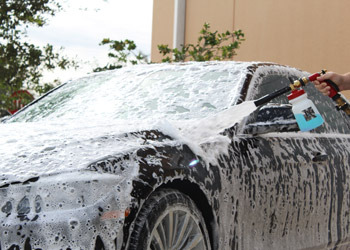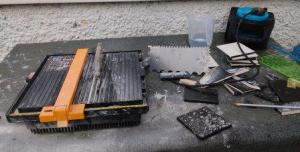
You can easily use 80 to 140 gallons of water using a garden hose to wash your car at home. That water you are using will then collect all sorts of nasty, harmful particles.
These particles can include gasoline, oil, heavy metal particles, tar and even particulate matter from exhaust fumes. All of that polluted material is then sent right down your driveway, into the sewer to wind up in the nearest lake or river, because most storm drains do not lead to a sewage treatment plant.
However, you do not need to give up washing your car altogether just to spare the environment your share of pollutants. There are a few easier, and cleaner solutions for you to try which will be a win, win solution for the environment and you.
Don’t Wash Your Car in the Driveway
If you want a more environmentally friendly car wash at home, get off the pavement. Park your vehicle on a flat penetrable surface such as the lawn, gravel or dirt, rather than the pavement.
Natural microbes in the grass, soil and dirt work as natural filters. They break down some of the polluted compounds in your wash water and prevent them from running off into the nearest storm drain.
Self-Service Car Wash
If you insist on washing your vehicle yourself, take it to a self-service car wash where the runoff water is captured and sent to a water treatment plant. This method of washing your car is usually the greenest and the least expensive option since you are using roughly 15 gallons of water.
Drive Through Car Wash
Additionally, you can use your biodegradable dish soap. The larger, drive-through car washes use more water than the self-service ones, about 35 to 50 gallons, depending on the type, however, that is still much less than if you washed it at home.
This is not a bad option either, however, make sure you skip the extra treatments they offer such as waxes. These usually aren’t eco-friendly options and will most likely turn a relatively safe choice into a polluted one.
Choose a Waterless Wash
Traditionally, washing your car yourself, at home, usually includes buckets, sponges, a long garden hose and soaked clothing because someone thought it would be funny to dowse you with a deluge of cold water (isn’t that special?)
Not anymore. There are plenty of premade, eco-friendly waterless car wash products on the market. You can also use a spray bottle with your home-made brew of cleaner and a couple of rags and wash your car without the water.
However, if you are using a commercial cleaner, make sure you read the directions and warnings, then carefully follow them, so you do not damage the finish on your vehicle or even harm yourself. Try a small area with the cleaner to make sure it will not harm the paint job on your car and if everything is good, go at it.
Vinegar
Make sure you save the runoff when you are washing your car with vinegar for an inexpensive salad dressing. Nah, I am just joking (about the salad).
Using a cloth soaked with vinegar or denatured alcohol is great for getting those tough baked-on dried bugs off of your vehicles finish. When finished make sure you rinse thoroughly and wax the treated area. If you do not do this, vinegar left on your paint job for too long with strip your car’s finish, so you need to be careful.
However, when used correctly, vinegar is excellent for getting dried on bugs or several other hard to clean spots off your car’s finish.
Natural Solutions to Dried on Gunk
For difficult to remove tree sap or tar, dab some peanut butter or solid shortening on the affected area, let it sit for a few minutes, and then wipe it off with a separate cloth before using a cleaner. Repeat this process a few times if necessary. Denatured alcohol will also remove tar and sap.
Use Natural Deodorizer
Vacuum the interior of your car really good to get all of that odor creating dirt from all of the nooks and crannies of your seats and carpet. When finished, sprinkle some odor-absorbing dry baking soda on the seats and carpet.
Let the baking soda sit for 30 minutes to 2 hours and then vacuum it all up good. This will kill all of the odors that linger in your car, especially cigarette smoke and real touch, deep down smells you just can’t seem to get rid of.
Organic Wax
Make your own paint finish protectant by mixing one-part fresh lemon juice with two parts olive oil in a small bowl. Dab a small amount of this mixture onto a small cloth and rub it over the dashboard and other plastic and vinyl surface.
However, don’t wipe this on the pedals, the steering wheel, or other surfaces that should never be slippery. Use an old, unused toothbrush to work the solution into cracks and remove trapped dust and gunk.
When done, buff the treated areas with a second, dry, clean cloth; the mixture will leave a soft shine and a pleasant smell behind.
As you can see, there are plenty of homemade solutions you can make and use to deep clean your car, just as well as any cleaning product you buy in an auto parts store. These products are much safer for the environment and a lot more affordable and better on your wallet at the same time.
Thank you for taking the time to visit my blog. If you enjoyed this article, please join my mailing list to make sure you do not miss a single informative and entertaining article as soon as it is published. I encourage you to start or join a discussion by adding a comment at the end of the article.
Also, I can help you with any of your professional content needs, including original blog articles, website content and all other forms of content management and marketing.
Please contact me at michael@mdtcreative.com, and I will put my 15+ years of experience to work for you.
Let’s Spread the Words Together!
Advertisements Share this:




